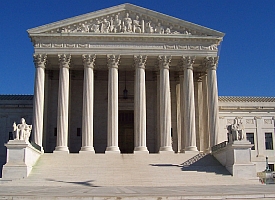Bloomberg News reports that the Supreme Court ruled today in favor of the Swiss pharmaceutical company Roche, against a suit filed by Stanford University in Palo Alto, California that contended Roche violated the university’s patent rights under the 1980 Bayh-Dole Act. The 7-2 vote affirmed a lower court decision that Roche became co-owner of the patents, for a process called Polymerase Chain Reaction (PCR), a test used to measure the amount of HIV in an HIV-positive person’s blood.
The case revolves around a scientist, Mark Holodniy, hired by Stanford as a research fellow. Holodniy was later assigned by Stanford to work for nine months with Cetus, a small company in California that in 1985 began developing methods of measuring the HIV viral load in blood that became PCR. Cetus required Holodniy to sign an agreement assigning any rights to ideas or inventions made as a consequence of his time at Cetus to that company.
Roche later bought Cetus and began developing test kits based on PCR. Stanford contended its original research on HIV measurement, funded by a National Institutes of Health grant, made the university the owner of the patents, by virtue of the Bayh-Dole Act, and Holodniy could not sign away those rights. The Bayh-Dole law gives universities the rights to federally-funded discoveries made by its personnel.
Roche, disagreed, saying the Holodniy’s agreement with Cetus assigned those rights dealing with Cetus’s work to Roche, when Roche bought the company. In 2005, Stanford then sued, alleging that Roche’s HIV test kits infringed on Stanford’s patents.
The district court sided with Stanford, citing the Bayh-Dole Act, that the scientist had no rights to assign to Cetus. The appeals court disagreed, concluding that the Holodniy’s agreement with Cetus assigned his rights to Cetus, and thus to Roche. It also found that the Bayh-Dole Act did not automatically void an inventor’s rights in federally-funded inventions.
Chief Justice John Roberts, writing for the majority, said rights to a patent begin with the inventor, not the inventor’s employer. “Although much in intellectual property law has changed in the 220 years since the first Patent Act,” wrote Roberts, “the basic idea that inventors have the right to patent their inventions has not.” Thus, the court sided with Holodniy’s assignment of the rights to his work on PCR to Cetus, which were acquired by Roche.
Gene Quinn, writing in IP Watchdog, says the decision “once and for all settled the rule that Bayh-Dole does not automatically vest title, which seems the appropriate decision.” Quinn notes, however, that the decision may not change all that much in the way universities and companies collaborate.
“There are no lasting lessons or holdings that will come from this case,” says Quinn. “The only lasting impact will be that now universities need to be far more careful with respect to the agreements they have researchers sign and far more vigilant about the agreements those researchers sign when they collaborate with joint venture partners, whether the joint venture is a formal one or one that is decidedly more informal.”
Read more: Univ of Washington Sues GE for Patent Infringement
* * *


 RSS - Posts
RSS - Posts
[…] Read more: Court Rules for Companies in University Collaborations […]